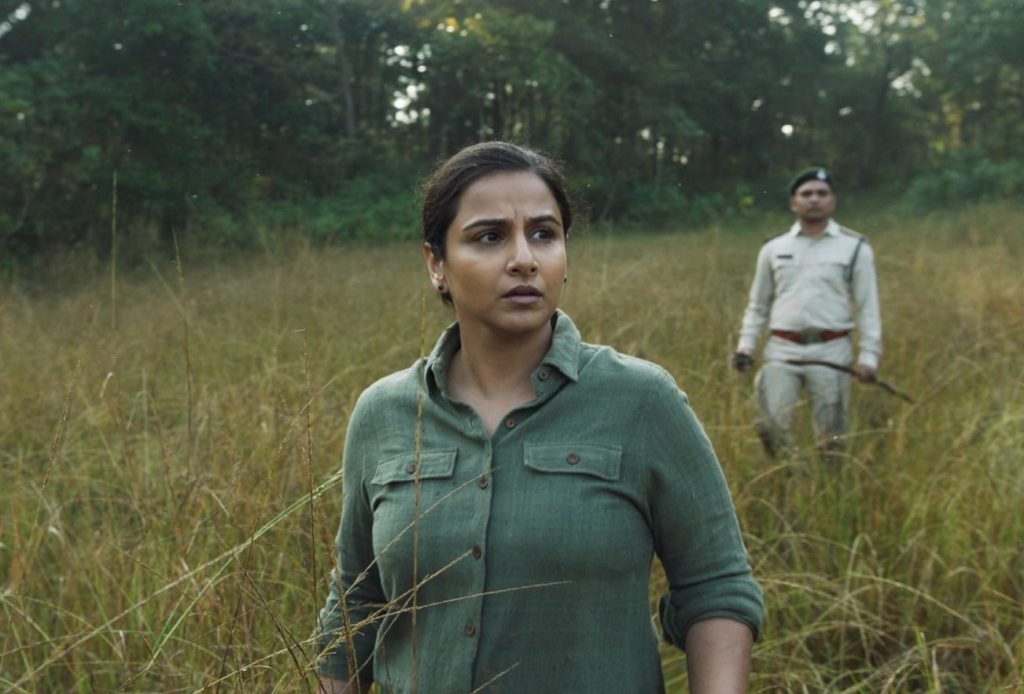Midway into Amit Masurkar’s third feature film Sherni (2021), streaming on Prime Video, Vidya Vincent (Vidya Balan) meets Saiprasad (Gopal Dutt), her predecessor, during a seminar. He informs her that the Forest Department is a legacy of the British Raj left to us. So, Vidya should work like them, bring in the revenue to appease the superiors and that will finally result in a promotion. There are many such instances in the film that take a probing look into the current socio-political footing of our society, leaves the viewers with some uncomfortable questions rather than just easy answers. The conflict and unrest that Vidya silently absorbs through the narrative make her realize just how loathsome is the world around her. Being true to herself, she chooses the life she wants by preferring dignity to servitude.
Sherni sees Vincent as a newly appointed Divisional Forrest Officer (DFO) in Bijashpur. At this point, she is unhappy with her nine years old profession that she wants to resign because of a lack of incentives and growth. But her husband, Pawan (Mukul Chadda), who works as a quality control manager at Jethamal chips, is going through a tough phase in his profession due to the recession. And he advises Vincent not to quit because her (government) job is recession-proof. When one of the villagers, who has gone into the forest for grazing his cattle despite warnings from the forest department, is killed by a female tiger, tension starts to build up in the area. Vincent and her team have to hunt for the man eater and make all the necessary arrangements to shift her to the safety of a National Park. As Vincent crosses one hurdle after the other, she is blessed with the companionship of Hassan Noorani (Vijay Raaz), a professor of Zoology. Both of them cope valiantly with the bureaucracy and red-tapism as they struggle to save the lives of the villagers as well as try to catch the tigress alive. As the situation spirals out of her grasp as more villagers start losing their lives, a remorseless private hunter, Ranjan Rajhans (Sharat Saxena) alias Mr. Pintu, is appointed by the higher officials to kill the beast. Vincent firmly believes that if the solution is to shoot the tiger, then why have a forest department at all?
In Sherni, loosely based on tigress Avni’s controversial killing in Maharashtra, Amit Masukar takes us deep into the world of man v/s animal conflict. Thematically, the film has few similarities with Masurkar’s earlier effort, Newton (2017), such as the integrity of the protagonist against corruption, government officials as antagonists, local tribal issues, a critique of the electoral system amongst others. The narrative is interspersed with metaphors (the ‘sherni’ of the title is obviously not just the tigress) but making sure at every step it never gets didactic. Still, Sherni lacks the thrust of his previous film and loses a bit in its translation from the written word to the cinematic image. This, despite the screenplay of the film (Aastha Tiku) being thoroughly researched and detailed and aided by some fine dialogues (Masurkar and Yashasvi Mishra), which bring perceptive observation, sharpness and satire in equal measure to the film. The treatment of the film is, however, far too subtle and understated and while it is not a tedious watch, it lacks the visceral impact which the writing promised.
The performances, though, are pitch perfect. From Sampa Mandal as the member of the village committee to Vijay Raaz, all the actors have played their roles with restrained and astute performances. Brijendra Kala, in particular, as an opportunist and sheepish soul is a delight to watch. However above all, it is Vidya Balan’s accomplish portrayal of the character caught in personal and professional turmoil that truly elevates the film. Whether as is a firm, dedicated and honest officer or a docile daughter–in–law, she carries off all the intricacies of her character expertly. It is hard to recall when recently we have in our midst, a mainstream Hindi film actress performing with such emotional energy and physical spontaneity.
The intensity of its images created by cinematographer Rakesh Haridas effectively draws out the beauty and dangers in a primitive environment, where animals have traditionally been in charge. The editing by Dipika Kalra lends lucidity to the narrative and its various layers, while capably sustaining the tempo and rhythm of the film. The background score by Benedict Taylor and Naren Chandavarkar tellingly lends a harmonic layer to the story.
Overall, Sherni has a polished approach and, no doubt, scores in its written originality. However, had its execution been just that bit more effective, it might not have made us feel lost at times within a large tract of dense forest land. Thankfully, it is Vidya Balan in her career-defining performance, who rescues us each time. Without fail.
Hindi, Drama, Color


